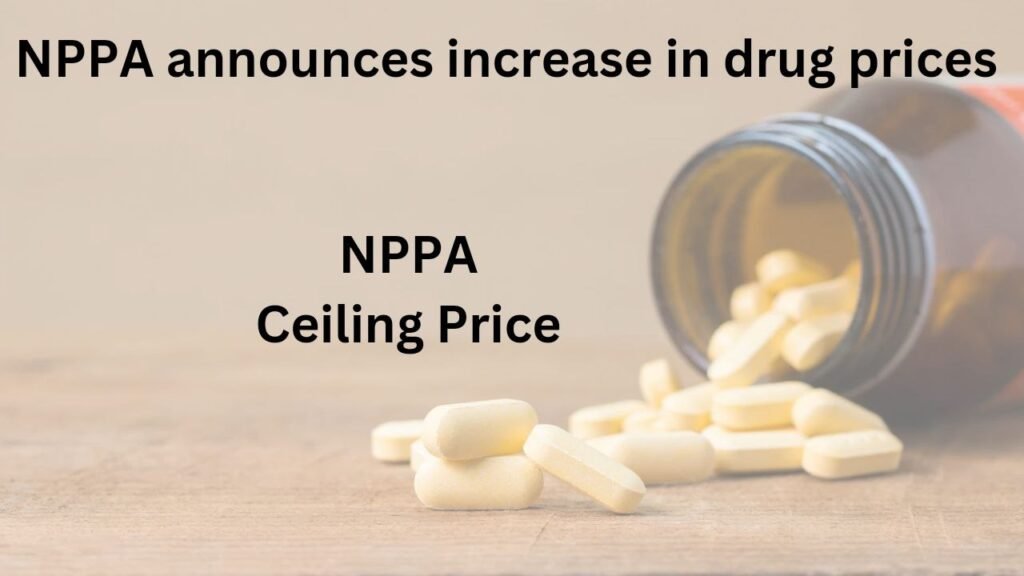NPPA Announces Increase in Drug Prices: What You Need to Know
In a recent development that has garnered significant attention, the National Pharmaceutical Pricing Authority (NPPA) has announced an increase in the ceiling prices of several essential drugs. This decision, effective from October 8, 2024, is a strategic move aimed at addressing the dynamic challenges in the pharmaceutical sector while ensuring that life saving medications remain both accessible and available to the public.

Understanding the National Pharmaceutical Pricing Authority (NPPA)
The National Pharmaceutical Pricing Authority (NPPA) was established in 1997 under the Ministry of Chemicals and Fertilizers, Government of India. Its primary role is to ensure the availability and affordability of medicines by regulating drug prices in the country. The NPPA monitors the prices of scheduled drugs under the Drug Prices Control Order (DPCO) and ensures that manufacturers comply with the prescribed ceiling prices. This regulatory body plays a crucial role in protecting consumer interests and promoting rational use of medicines.
What is a Ceiling Price?
A ceiling price is the maximum price that can be charged for a product or service, set by the government to protect consumers from excessive pricing. In the context of pharmaceuticals, the NPPA sets the ceiling prices for essential medicines listed under the DPCO. These prices are determined based on various factors, including the cost of production, market demand, and economic conditions. The primary objective is to make essential medicines affordable while ensuring that manufacturers can sustain their operations and continue to supply these drugs.
Recent Changes in Drug Prices
The NPPA has recently approved a 50% increase in the ceiling prices of eleven scheduled formulations of eight drugs. These drugs are crucial for treating a range of medical conditions, including asthma, glaucoma, thalassemia, tuberculosis, and mental health disorders. The price hike is primarily attributed to the rising costs of Active Pharmaceutical Ingredients (APIs), production expenses, and fluctuations in exchange rates. The NPPA has emphasized that this adjustment is necessary to ensure the continued availability of these essential drugs in the market.
Factors Influencing the Price Increase
Several factors have contributed to the recent decision by the NPPA to increase the ceiling prices of certain drugs. One of the main reasons is the rising cost of APIs, which are crucial components in drug manufacturing. Over the past few years, there has been a significant increase in the prices of APIs due to various factors, including supply chain disruptions, geopolitical tensions, and increased demand for raw materials. These factors have put immense pressure on pharmaceutical manufacturers, making it difficult for them to maintain the current prices of essential drugs.
Another factor influencing the price increase is the rising cost of production. This includes costs related to labor, energy, transportation, and compliance with regulatory requirements. Manufacturers have been facing increased operational costs, which have impacted their ability to sustain production at current prices. The NPPA’s decision to increase ceiling prices aims to address these challenges and ensure that manufacturers can continue to supply essential drugs without compromising on quality or availability.
Impact on Consumers
The increase in ceiling prices is likely to have a significant impact on consumers, particularly those who rely on these essential drugs for their daily healthcare needs. While the price hike may lead to higher costs for consumers, the NPPA has emphasized that this step is necessary to ensure the continued availability of these drugs in the market. The authority believes that without this adjustment, manufacturers might struggle to sustain production and distribution, potentially leading to shortages and disruptions in the supply of essential medicines.
It is important for consumers to understand that the NPPA’s decision is driven by the need to balance affordability and availability. By allowing manufacturers to adjust prices in response to rising costs, the NPPA aims to ensure that essential drugs remain accessible to those who need them the most. The authority is also closely monitoring the market to prevent any undue profiteering and to ensure that the price increase is justified and reasonable.
The Role of NPPA in Ensuring Affordable Healthcare
The NPPA plays a vital role in ensuring that essential medicines remain affordable and accessible to the public. In addition to regulating drug prices, the NPPA also monitors the availability of essential medicines and takes necessary actions to address any shortages or supply disruptions. The authority works closely with pharmaceutical manufacturers, healthcare providers, and other stakeholders to ensure that the healthcare needs of the population are met.
One of the key responsibilities of the NPPA is to ensure that drug prices are set at a level that balances the interests of consumers and manufacturers. This involves conducting thorough market analysis, considering the cost of production, and assessing the economic conditions. The NPPA also takes into account the feedback from various stakeholders, including patient groups, healthcare professionals, and industry representatives, to ensure that its decisions are well-informed and aligned with the needs of the population.
Future Outlook
The recent price increase by the NPPA is a significant step in addressing the challenges faced by the pharmaceutical sector. However, it also highlights the need for ongoing efforts to ensure the sustainability of the healthcare system. As the cost of production and APIs continues to rise, it is crucial for the NPPA and other regulatory bodies to work collaboratively with the industry to find innovative solutions that can help manage costs while ensuring the availability of essential medicines.
In the long term, there is a need for greater investment in research and development, as well as efforts to strengthen the supply chain for APIs and other raw materials. By fostering innovation and improving efficiency, the pharmaceutical industry can continue to meet the growing healthcare needs of the population while maintaining affordability and accessibility.
Conclusion
The decision by the NPPA to increase the ceiling prices of certain essential drugs is a necessary step to address the rising costs of production and ensure the continued availability of these medicines. While the price hike may lead to higher costs for consumers, it is important to understand that this adjustment is driven by the need to balance affordability and availability. The NPPA remains committed to protecting consumer interests and promoting rational use of medicines, and it will continue to monitor the market to ensure that essential drugs remain accessible to all.
As we move forward, it is crucial for all stakeholders to work together to find innovative solutions that can help manage costs and ensure the sustainability of the healthcare system. By fostering collaboration and investment in research and development, we can continue to meet the healthcare needs of the population and ensure that essential medicines remain accessible and affordable for all.
For more regular updates you can visit our social media accounts,
Instagram: Follow us
Facebook: Follow us
WhatsApp: Join us
Telegram: Join us
